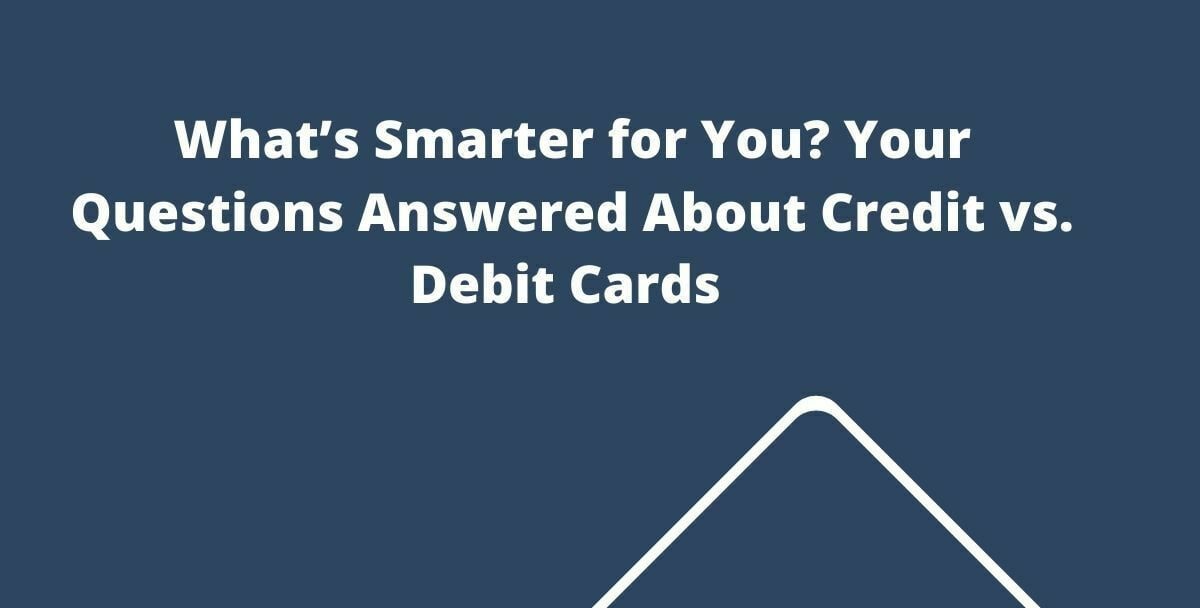Credit vs. Debit Cards Your Questions Answered for Smarter Choices

Credit cards and debit cards don’t just look similar, they have a similar purpose: to give you purchasing power. But despite the fact that they’re both plastic, they function very differently.
Deciding between a credit card or debit card requires weighing the pros and cons of both. For example, credit cards let users borrow funds. On the other hand, their high-interest rates can make it difficult to pay the money back. And while debit cards can help you avoid debt, they won’t help you build credit.
Below we discuss the differences between credit cards and debit cards. Knowing these will help you make the right choice.
Credit Card Context
There’s no denying that credit cards have their benefits. They can help you build a credit history, and they let you pay bills over time.
If you’re not careful, though, you can acquire credit card debt that could wreak havoc on your life. According to Experian data from 2020, there is more than $756 billion in credit card debt outstanding in the United States.
A credit card might still be the best option depending on your financial goals. If you want to build your credit score, a credit card is a good option for you. But if you’re not great at managing money, a credit card may be more trouble than it’s worth.
Debit Card Context
Debit cards are convenient, easy to obtain, and usually come with fewer fees than a credit card. They are great for setting a budget and sticking to it.
However, they do have some downsides. For example, what if a large, necessary expense comes your way? If you don’t have enough money in your account, you can’t make the purchase. That might leave you in a desperate situation.
Getting down to brass tacks, here’s what you should know about your options:
Building a Credit History
As noted earlier, one of the biggest benefits of credit cards is that they allow you to build credit, improving your credit history. A solid credit history is important because it helps lenders, employers, and insurers learn more about you. Oftentimes they’ll want to know how you manage your finances before starting a business relationship with you.
Your credit history also determines the type of credit you’ll obtain and your interest rate. For example, a low credit score typically means you’ll be stuck with a higher interest rate. If you have a high credit score, you can score a lower interest rate. If you want to build your credit history, get a credit card — just pay close attention to the costs.
A debit card can’t help you on the credit-building front. The debit card won’t make your credit score go down, but it can’t raise it either.
Interest
Credit cards charge interest. If you don’t pay off your balance every single month, you’ll acquire debt with interest. To avoid collecting interest, many use tools, such as calendar apps, to remind them each month of when their card bills are due. Interest increases the overall price of your purchases. In time, it can become much harder to pay down the balance.
Debit cards, on the other hand, don’t charge interest. That’s because when you pay with a debit card, the money is automatically taken from your bank account.
If you don’t have the money, your card will be declined — unless you have overdraft protection. If you have it, the bank will still push the transaction through and charge you a fee.
Additional Fees
Most credit cards charge fees, and there are a range of them. Some cards charge foreign transaction fees, late payment fees, and annual fees. Those costs can add up fast. Make sure you’re aware of the issuer’s fees before you apply for a particular credit card.
That said, fees aren’t always a bad thing. Some credit cards with good rewards programs have annual fees. These might be worth paying depending on your goals.
Some ATMs do charge fees on debit cards, but those fees are often avoidable. Use an ATM in your bank’s network, and you won’t face extra charges.
Fraud and Theft Prevention
Most major credit card companies offer $0 liability guarantees. This means that if your card is stolen and used without your permission, you won’t be responsible for those charges.
If someone uses your credit card without permission, the cost of that purchase doesn’t come out of your account. Instead, it’s taken from your bank. In other words, it’s not directly impacting your funds. Just be sure to report a suspicious charge or a missing card as soon as you notice what’s happened.
Debit cards may not have the security of credit cards, but they’re still very secure. For example, a thief might steal your debit card, but that doesn’t mean they’ve got your PIN. Without the number, they’ll find the card difficult to use.
Some banks even offer two-factor authentication. So even if your debit card information is stolen, you’d still be protected.
Access to Cash
Credit cards use the bank’s money. If you pull out money from an ATM with a credit account, it will cost you extra.
Debit cards give you physical access to your money. You can use your debit card to withdraw cash directly from an ATM.
